Ser Estoico. Encuentros de Bienestar || Being stoic. Wellness Meetings
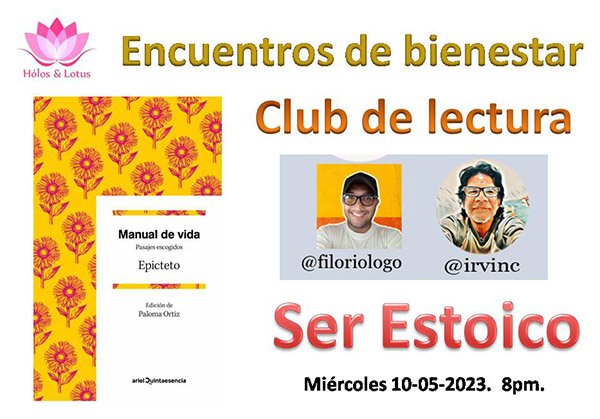
Es probable que en algún momento hayas escuchado a una persona decir que es estoica e incluso, conociendo algunos hechos de su historia de vida, no dudas en declararlo como una persona estoica para significar con ello que ha sabido superar situaciones difíciles sin perder su esencia.
A medida que avanzamos y profundizamos en el conocimiento y práctica de crecimiento personal, nos damos cuentas que gran parte de la estructura de su pensamiento tiene sus bases en la filosofía de la Grecia antigua, que Aristóteles, Platón, Sócrates, Epicteto, entre tantos otros, nos han legado los fundamento de las corrientes occidentales que manejamos hoy en día a través del crecimiento personal.
Epicteto, como uno de los máximos representantes de la Escuela Estoica, se encuentra presente en muchos de nuestros propósitos de crecimiento, en esa búsqueda constante de querer vivir y sentir un mayor bienestar interior.
Por eso, cuando @irvinc nos propuso desde “Encuentros de Bienestar “ y el “Club de Lectura” leer “El Manual de Vida” de Epicteto me pareció una excelente oportunidad para conocer de “primera mano” a un pensador que de muchas maneras guía mi ser y hacer, además que despierta mi curiosidad e interés la tertulia que este miércoles 10 de mayo @irvinc y @filoriologo nos invitan a compartir.
Para la “discusión” tomaré solo dos puntos de los tantos que trabaja el autor, aquí mi apreciación al respecto.
Las representaciones
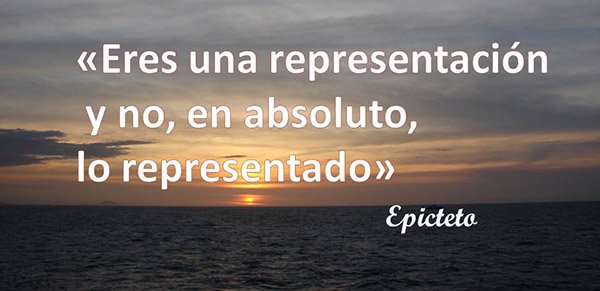
¿Quién soy? Ah, qué complicado se me pone comprender esta interpelación, quizás pueda llegarle explicándome quién no soy, lo representado, entonces no soy la madre, no soy la maestra, no soy la escritora, ni la emprendedora, ni todo aquello que pueda decir que me representa y que pertenecen al mundo exterior.
El quién soy radica en mi esencia, soy energía, soy luz, soy parte de un todo, soy una representación de vida.
Para el filósofo las representaciones son opiniones, me parece que el concepto que más encaja en la actualidad con la idea que nos presenta son las percepciones y son percepciones que no tiene nada que ver con el albedrío, pues el albedrío se sustenta en las virtudes que tenemos y estas son inamovibles, aun cuando en un momento determinado, dichas virtudes puedan ser golpeadas, maltratadas, al estar presentes en nosotros, ellas buscan restablecerse en su lugar encontrando el equilibrio que es la esencia natural del ser.
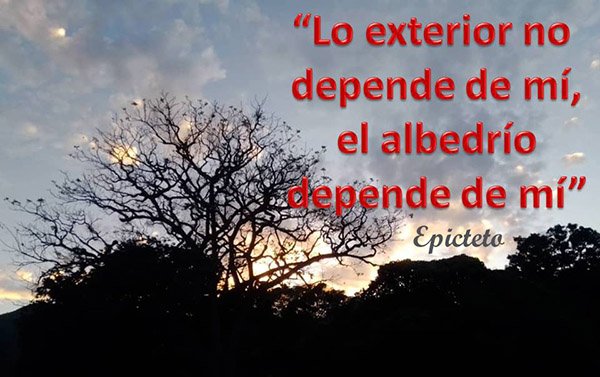
De aquí que Epicteto se afane a lo largo de sus sentencias en explicarnos como se muestran las representaciones, con ellas profundiza en el equilibrio, el libre albedrío y nuestro interior.
Cuántas veces no hemos escuchado la frase citada. Me parece que tiene que ver con la aceptación y el control.
Las representaciones están allí, son el mundo exterior, las percepciones que yo tengo y las que tienen los demás. Me hablan de lo bueno y de lo malo, de lo justo e injusto. Cuando comprendo que eso no lo puedo controlar; que lo que puedo controlar es lo que pienso o, el cómo percibo ese mundo exterior vivo en libertad.
Al aceptar esta premisa asumo que lo externo: “No tiene que ver conmigo” y desde allí puedo tener sosiego y serenidad.
Por mi parte, creo que tratar de vivir con la idea de que lo externo “no tiene que ver conmigo” me llenaría de una gran culpa, quizás sintiéndome egoísta, poco solidaria y empática, con falta de sensibilidad social y negando con ello el valor que tienen para mí las relaciones significativas que hay en mi vida.
Sin embargo, cuando miro el contexto de forma más amplia, me parece que el autor apunta a nuestra esencia, a nuestras virtudes y que ese mundo exterior no tiene que ver conmigo en la medida en que no permita ser transformada en mi esencia por aquello que está fuera de mí y atenta a mis virtudes.
La verdad es que el solo hecho de aceptar que solo depende de nosotros decidir lo que pensamos, la mirada que tenemos ante las situaciones y los principios, valores, virtudes por las cuales nos guiamos nos convierte en verdaderos estoicos ¿No les parece?

In English
It is likely that at some point we have heard a person say that he is stoic or even, knowing some facts of his life history, we do not hesitate to declare him as a stoic person to mean that he has been able to overcome difficult situations without losing his essence.
As we advance and deepen in the knowledge and practice of personal growth, we realize that much of the structure of his thought has its foundations in the philosophy of ancient Greece, that Aristotle, Plato, Socrates, Epictetus, among many others, have bequeathed us the foundation of the Western currents that we handle today through personal growth.
Epictetus, as one of the maximum representatives of the Stoic School, is present in many of our growth purposes, in that constant search of wanting to live and feel a greater inner well-being.
Therefore, when @irvinc proposed us from "Encuentros de Bienestar" and the "Club de Lectura" to read "El Manual de Vida" by Epictetus, it seemed to me an excellent opportunity to know "first hand" a thinker who in many ways guides my being and doing, in addition to arouse my curiosity and interest in the discussion that this Wednesday, May 10 @irvinc and @filoriologo invite us to share.
For the "discussion" I will take only two points of the many that the author works, here my appreciation in this regard.
The representations
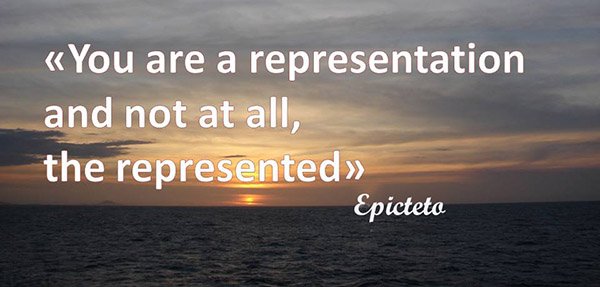
Who am I? Ah, how complicated it is for me to understand this interpellation, perhaps I can explain to you who I am not, what is represented, so I am not the mother, I am not the teacher, I am not the writer, nor the entrepreneur, nor all that I can say that represents me and that belong to the outside world.
Who I am lies in my essence, I am energy, I am light, I am part of a whole, I am a representation of life.
For the philosopher, representations are opinions, it seems to me that the concept that fits best with the idea he presents to us today are perceptions and they are perceptions that have nothing to do with agency, because agency is based on the virtues we have and these are immovable even when at a given moment, these virtues can be hit, abused, when they are present in us they seek to reestablish themselves in their place, finding the balance that is the natural essence of being.
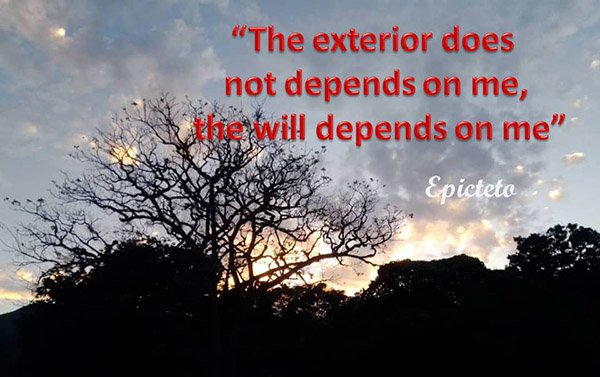
Hence Epictetus is concerned throughout his sentences in explaining to us how the representations show themselves, with them he delves into the balance, free will and our inner self.
How many times have we not heard this phrase. It seems to me that it has to do with acceptance and control.
The representations are there, they are the external world, the perceptions that I have and that others have. They speak to me of good and bad, of fair and unfair. When I understand that I cannot control this, that what I can control is what I think or how I perceive the external world, I live in freedom. When I accept this premise I assume that the external: "It has nothing to do with me" and from there I can have peace and serenity.
For my part, I believe that trying to live with the idea that the external "has nothing to do with me" would fill me with great guilt, perhaps making me feel selfish, lacking in solidarity and empathy, with a lack of social sensitivity and thus denying the value that the significant relationships in my life have for me.
However, when I look at the context more broadly, it seems to me that the author points to our essence, to our virtues, and that the outside world has nothing to do with me insofar as I do not allow myself to be transformed in my essence by what is outside of me and attentive to my virtues.
The truth is that the mere fact of accepting that it only depends on us to decide what we think, the way we look at situations and the principles, values and virtues by which we are guided makes us true stoics, don't you think?

Translated with www.DeepL.com/Translator (free version)
Fuente de imagenes: Portada - Fotografías: Archivo personal



MIS REDES SOCIALES





Be Entrepreneur



Tocas en tu escrito uno de los temas esenciales dentro del estoicismo. Es interesante como hace tanto tiempo Epicteto se dio cuenta que nuestra percepción era algo subjetivo, lo que nos permitía tener diferentes versiones de un mismo "hecho". Gracias por participar de la iniciativa estimada @damarysvibra . En el programa seguro que conversaremos sobre este tema de las representaciones en el contexto del estoicismo. Un fuerte abrazo.
Hola, saludos @irvinc, sí, siempre me ha parecido que lo que resulta novedoso en un determinado momento histórico resulta que tiene sus bases en pensadores tan antiguos. Nos veremos en el programa. 😊